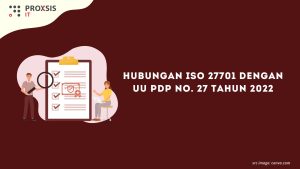
- Permata Kuningan Building Lantai 17,...
- [email protected]
The most recent version of the ISO/IEC 27001:2013 SMKI standard is ISO/IEC 27001:2022. An globally regarded collection of organized guidelines for protecting an organization’s information systems is called ISO/IEC 27001.
Based on “best practice” in information security, ISO 27001:2013 provides a basic explanation of what a firm must do in its efforts to evaluate, implement, and manage information security in businesses.
Those sectors are required to ensure the security of data that is regularly managed for business purposes, and this is further encouraged by the existence of several Indonesian regulations that demand ISO/IEC 27001:2022 certification (for instance, the Minister of Communication and Informatics, POJK, PBI, and Government Regulations of the Republic of Indonesia).

As a regulatory provider

Industries subject to Indonesian rules whereby they apply ISO/IEC 27001:2022

Securing patient data

KOMINKO ministerial regulation No.12 of 2016

KOMINKO ministerial regulation No.36 of 2014

Organization that accredited to ISO 27001:2013
Do you have additional questions?
Protection of Sensitive Information: The ISO/IEC 27001:2022 standard helps businesses recognize sensitive information, manage risk, and safeguard it against threats and potentially dangerous dangers.
Risk Management: This standard aids businesses in detecting, analyzing, and evaluating information security risks. Organizations can take the necessary steps to decrease risks and prevent possible losses with good risk management.
Legal and Regulatory Compliance: ISO/IEC 27001:2022 helps enterprises to understand and stick to legal and governmental rules pertaining to information security. This may lessen the negative effects noncompliance could have on one’s reputation and legal standing.
concurrently with the surveillance or recertification process.
Depending on the requirements of the business, at least four months for implementation
In addition to offering a set of instructions, Proxsis can also assist with migration up until the KAN agency issues the most recent certification.